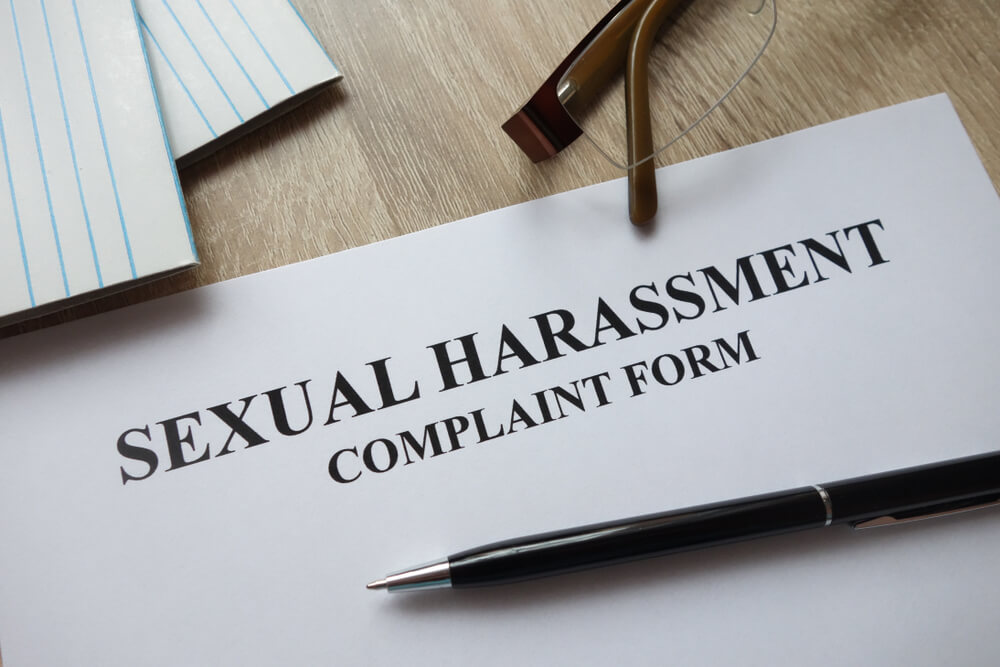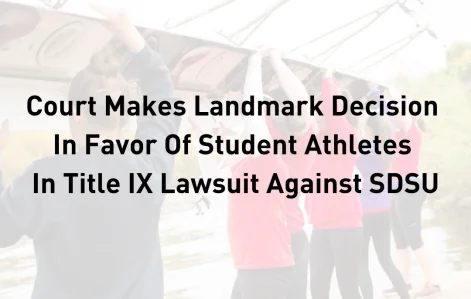You should never feel unsafe or uncomfortable in any location, especially places where you spend so much time, like work. Still, under certain circumstances, a harasser may purposely make you feel stressed and overwhelmed by making you the target of their sexually harassing behaviors, constituting sexual harassment.
Sexual harassment is not only wrongful but also illegal. If anyone sexually harasses you, do not hesitate to discuss your situation with a local sexual harassment attorney as quickly as possible to protect yourself and your rights.
Schedule a Free Case Evaluation
Understanding Sexual Harassment
Sexual harassment refers inappropriate and unwelcome behaviors. When a person experiences sexual harassment, they can feel stressed, awkward, or even worried for their safety.
Many times, sexual harassment goes unreported, and harassers get away with their wrongful behavior. For this reason, a lawyer can explain the signs of sexual harassment, your rights, and your options should someone harass you.
Recognizing Sexual Harassment
Fully understanding sexual harassment means knowing what behaviors to look for. Sexual harassment comes in verbal, non-verbal, or physical forms.
Common examples of verbal sexual harassment include:
- Asking for sexual favors
- Sexual jokes
- Inappropriate comments about your looks
- Unwelcome sexual advances
- Discussing sexual stories or fantasies
- Spreading inappropriate rumors
Common non-verbal examples of sexual harassment include:
- Blowing kisses
- Winking
- Making crude body gestures
- Making faces
- Whistling or catcalling
Finally, signs of physical sexual harassment include:
- Unwelcome physical contact, like hugs
- Rubbing up against a person
- Getting too close to a person
- Touching a person in an inappropriate place
Sexual harassment may start mild, with some verbal and non-verbal cues, and transition into physical contact as the harasser gets more comfortable acting inappropriately.
When a person sexually harasses you, protect yourself and keep others around you safe.
Who Can Be a Victim of Sexual Harassment?
There are several misconceptions about sexual harassment. One of the most significant is that sexual harassment only happens to certain people.
In reality, sexual harassment can happen to just about anyone. Regardless of your age, gender, race, sex, nationality, sexual orientation, or religion, you’re at risk of falling victim to sexual harassment.
Sexual harassment does not discriminate. What’s important is determining whether a person is experiencing unwanted, inappropriate behavior.
Additionally, a person does not have to be a direct victim of sexual harassment. You may have a claim for sexual harassment if you saw a harasser’s wrongdoing and the harassment has affected you in some way.
Therefore, harassment can affect anyone, regardless of your circumstances.
Where Does Sexual Harassment Happen Most?
Sexual harassment can happen almost anywhere. However, sexual harassment occurs more in certain locations than others, including schools and workplaces, as isolated incidents or, more often, repeated offenses. For this reason, sexual harassment often occurs in locations where a person frequents, like school or work.
Still, if you believe someone sexually harassed you, discuss your situation with a sexual harassment attorney to determine whether you have a valid claim.
Types of Sexual Harassment in the Workplace
The workplace is one of the most common places where sexual harassment takes place. This is partly because harassers get comfortable harassing their victims, especially in certain situations, including when the harasser is in a position of power.
Because sexual harassment in the workplace happens so frequently, the law recognizes two distinct types of sexual harassment at work: quid pro quo sexual harassment and hostile work environment.
Quid Pro Quo Sexual Harassment
Quid pro quo is Latin, meaning “something for something.” When it comes to sexual harassment, quid pro quo means the harasser asks their victim for something, usually sexual relations, in exchange for a benefit. They can also threaten adverse action if the victim does not agree to sexual conduct.
In most cases, the individual doing the harassing requests a sexual favor, like a sexual act, in exchange for something work-related, including:
- A job
- Promotion
- Raise
- Better work hours
- A transfer to a desired work location
- Protection during periods of layoffs
Usually, harassers who engage in quid pro quo harassment are in power positions, while their victims are in lower positions. Higher-ups may feel they can get away with harassing behavior, and the victim will do as requested to receive the promised benefit.
Sometimes, victims feel backed into a corner with no choice but to agree to the harasser’s request. Whether the victim agrees to sexual conduct or inappropriate acts does not affect their ability to take action against the harasser. This does not change anything for victims – a wrongful act is still wrong.
Hostile Work Environment
The second type of workplace sexual harassment involves a hostile work environment. This is because harassers can make a situation so bad for their victim that they create an abusive, offensive, or otherwise hostile work environment.
Typically, in a hostile work environment, the harasser’s behavior is enough to create a bad situation for the victim.
Harassers in a hostile work environment can work with the victim or frequent their place of business, including:
- Supervisors
- Coworkers
- Clients
- Customers
- Vendors
The harasser’s repetitive behavior makes a work environment hostile if the behavior would offend a reasonable person.
A victim of hostile work environment sexual harassment may put up with the harassment for fear of potential consequences, like losing their job or retaliation by the harasser or the company.
How California Defines Sexual Harassment
In California, the Fair Employment and Housing Act (FEHA) dictates the laws concerning workplace sexual harassment. Under the Act, sexual harassment is sexually suggestive and unwanted verbal or physical advances toward an individual with whom the harasser has a professional relationship.
The law also protects those who do not have a professional relationship with the harasser. Sexual harassment can occur between individuals with varying relationships in other settings, and the law protects them all the same.
Is Sexual Harassment Illegal in California?
Sexual harassment violates the law in California and everywhere else in the United States. Therefore, if a person sexually harasses someone, they may face serious consequences under the law—both civilly and criminally.
The law also requires employers to prevent sexual harassment at work in California. If an employer fails to abide by these requirements, a company can face civil liability and potential penalties from the government.
What to Do if You Believe Someone Sexually Harassed You
If you or someone you know experience sexual harassment, develop a plan with a sexual harassment lawyer, especially if you experience harassment frequently and it interferes with your work or life.
The following steps can protect your rights and allow you to file a claim.
Collect Evidence and Documentation of the Incidents
The first time or two you experience sexual harassment, you may not know it. However, if you find the harasser continues to engage in inappropriate conduct, whether verbal, visual, or physical, start gathering evidence.
Helpful evidence of sexual harassment can include:
- Emails
- Text messages
- Phone messages
- Videos and photos
- Handwritten notes
If you can collect any documentation or evidence to show the harasser’s wrongful behavior, save it just in case. Your lawyer may use it later.
Speak to Your Harasser
Some sexual harassment victims can avoid further upset by talking to their harasser. Sometimes, a person engaging in sexual harassment behavior may not realize their behavior offended you. A simple talk can help resolve any issues.
Alternatively, your harasser may know they engaged in wrongful behavior but may think you’d never take action against them. Having a talk with these individuals may scare them into correcting their behavior for fear of the repercussions.
Still, if you’re seriously intimidated by your harasser, or you don’t feel comfortable or safe speaking with them, you can proceed without doing so.
Notify Your Employer
Become familiar with your employer’s harassment policy. You can either ask human resources or refer to your employee handbook.
Typically, employers have protocols to follow if an employee experiences harassment. This may require you to speak directly with your supervisor or your company’s HR department and file a complaint against your harasser.
Once your employer knows the harassment, they can conduct an internal investigation to determine whether your claims are true. If they determine a reason to believe your claims of harassment are valid, your company may take action against the harasser. However, they may also decide not to act or determine your claims are false.
Remember, too, that HR departments work for and protect the company, not you. Call a lawyer to determine how best to talk to HR.
Depending on the outcome of your company’s investigation, you may proceed with a more formal complaint.
File a Formal Complaint with a Governmental Agency
Two agencies handle harassment issues: the Equal Employment Opportunity Commission (EEOC) and the California Civil Rights Department (CRD). The Equal Employment Opportunity Commission is the federal agency that enforces anti-discrimination laws in the workplace. The California Civil Rights Department specifically protects California residents from wrongful and illegal conduct in the workplace.
Your sexual harassment attorney can determine the best place to begin your claim process. Often, California employees will file a complaint with the state agency.
After filing your complaint, you can determine whether you’d like the agency to investigate. If they do and they find a state or federal law violation, they can remedy the issue.
You may skip the agency’s investigation and request a right to sue to pursue formal legal action.
Take Legal Action
Taking legal action against your harasser or employer requires special permission from the EEOC or CRD. You cannot proceed with your legal claim unless you receive a right-to-sue letter allowing you to file a lawsuit.
If you can file a lawsuit in court, hire a qualified sexual harassment attorney to handle your claim and provide experienced representation.
Are There Time Limits on Sexual Harassment Claims?
When it comes to civil cases, a statute of limitations dictates how long a person has to file their lawsuit. It’s no different for sexual harassment cases. However, your state’s laws may differ.
Generally, you have three years to file your complaint with the CRD and a maximum of 300 days to file it with the EEOC. These dates may vary, so consult a sexual harassment attorney.
Additionally, obtaining a right-to-sue letter means you have one year to file your lawsuit.
Missing a deadline can seriously affect your ability to seek justice and obtain compensation for sexual harassment. Therefore, get moving as quickly as possible.
An Experienced Sexual Harassment Attorney Can Help
You cannot handle a sexual harassment cases alone. Sexual harassment can affect you mentally and emotionally, and the added stress of handling your claim can overwhelm you.
A sexual harassment attorney can provide much-needed guidance and advice and determine your case’s best course of action.
To ensure your claim proceeds appropriately and within the required time frame, seek help from a local employment lawyer in San Diego right away.





